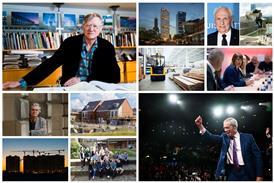In this examination of the role artificial intelligence can play in our future, Diego Padilla-Philipps envisions a world in which human creativity and individualism, passions and emotions will always have a place

O brave new world!
In Aldous Huxley’s dystopian novel, society has evolved through science and efficiency into an intelligence-based hierarchy where emotions and individuality are seen as the cause of all conflict and therefore eliminated. It is a scary vision of a perfect future that has no soul, no passion. In a 2020 television series based on the novel, the system is controlled by an artificial intelligence that has plans of her own.
In our world, AI is excelling at jobs that do not involve imagination, such as data analysis. But, when it comes to emotions like empathy and compassion, humans outperform them.
Should this continue, it can lead to a future contrary to Huxley’s, where emotions, individuality, creativity, passion and humanity are the most important and valuable aspects of life.
A new world made possible
The Chinese AI pioneer Kai-Fu Lee describes how AI could transform our lives by 2040. Through a series of captivating stories, he presents a world full of possibilities, but also challenges.
Augmented reality goggles already allow you to have a mixed-reality desk set-up, enabling screens and other user interfaces to float out of thin air. Soon these devices will be as small and light as your regular specs, and it will open a whole new world where we superimpose a digital layer to everything we do; from showing prices at a store to guiding us through the city using enhanced maps with directions and information.
No more computer screens inside an office! And no more neck pain from constantly looking down.
Personalised assistants will help us to navigate our daily lives, but more importantly, they will tailor the experience to what we need. Imagine each school kid having a personal (and personalised) tutor that helps them to learn while adapting and responding to their needs and learning style.
This would mean that the best education was accessible to everyone. The assistants could guide us, remind us to eat healthily, to walk a few more steps, monitor our health and focus on preventative action.
As AI-powered systems and applications learn from our behaviour, they will be able to predict and understand what makes us happy, how to fight loneliness and anxiety. AI assistants could provide better care for the elderly – robot companions are already a reality in many parts of the world.
But it goes beyond just help for the individual. AI has the potential to transform the health system, through helping us to use resources more efficiently, providing a GP without any waiting times, diagnosing and diverting people to the right services.
It could help us to develop vaccines and new treatments using bioengineering with the potential to bolster our resilience and response to the next pandemic.
AI can also create massive wealth and improve living conditions everywhere. From smart energy generation and distribution to automated, coordinated, transport systems including smart self-driving vehicles that speak to each other and eliminate traffic, it could even change the current idea of private car ownership and move us towards a shared system using apps.
A future where universal basic income is the norm is also not beyond our imagination, lifting everyone out of poverty. But there is a common fear that AI could replace certain jobs.
In a society where what we do gives us purpose, it is easy to imagine how not having a meaningful job will impact our mental health and the social order. We will therefore need a complete reimagining of our society and how we find meaning in what we do if we are not “working.”
A world not without challenges
As with everything in this world, there is a balance that must exist, in this case between the possibilities and challenges of artificial intelligence. For example, Kai-Fu Lee presents a dystopian but plausible alternative to the possibilities that AI brings to healthcare, where health insurance premiums are linked to the data that our devices report from our activities, the places we visit, the people we date – using this data to determine your personal risk and therefore your insurance package in real time.
This cautionary tale highlights the massive risk that comes with how our data is used, who owns it, and how it can lead to perpetuating bias, prejudice and discrimination.
Deepfakes also have the potential to be very disruptive, and there are already many cases of fraud, extortion and political manipulation that have resulted from fake content.
The phenomenon is a real threat to democracies and business, and the technology is only getting better. Beyond this, warfare will be fundamentally different when we consider global cyber-crime and automated lethal machines.
AI and the built environment
When it comes to buildings and the built environment, the change will also be great. Not only in how we design and build them, but fundamentally how we use them and therefore what they are.
Imagine a world where all the above is a reality. Would current buildings be adequate to accommodate such needs? Will schools be the same? How about hospitals?
In a world without screens or laptops, offices will need to transform (again), cities will need to adapt, buildings will therefore be fundamentally different to their current form. As part of our Future Ready initiative, WSP is partnering with leading tech firms to explore exactly this.
Some say they would like AI to do their laundry so they can write and do art. But I wonder: what would the world be like if we were all poets and painters?
>> Also read: ‘No turning back’ says Oki as RIBA report shows 41% of UK architects now using AI
The aspiration is of course for AI to help democratise skills which, when inaccessible, stand as high barriers to social mobility, such as strong writing ability or public speaking, both of which are a reflection of privilege; to see AI help every child get access to the best education possible, and even help us find a cure for cancer; that, in our lifetime, AI and robotics will help us to develop new materials and construction techniques that are more than carbon neutral, restorative and regenerative.
We might therefore aim for a future in which AI helps to create a more inclusive and equitable world, where people have time and resources to do things that give them purpose.
Despite the challenges, this can be possible. Unlike Huxley’s vision of dystopia, our brave new world does and will exist because of our creativity and individualism, both of which make designs more exciting and the product more fulfilling. But, more importantly, because of our emotions and passions; the things that give us meaning. AI could never replace such fundamental humanity.
This brings me back to laundry. I love art and writing, but I also really enjoy doing my laundry. It is one of those simple tasks that gives me a good sense of achievement. I do hope that AI does not take it away.
Postscript
Diego Padilla-Philipps is director of decarbonisation and innovation for building structures at WSP. This is the third of three columns about the growth of AI in the construction sector and what property professionals can expect to see in the future.
PS AI was not used to write this column or any of his previous ones… or was it?
















No comments yet